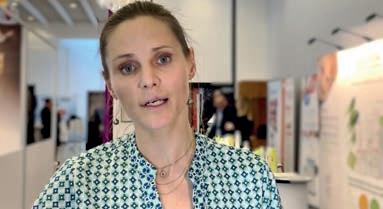
4 minute read
NCDV 2022 MEDtalk highlights
This year BestPractice Nordic was present at the 35th NCDV congress, covering the latest news from dermatology. On bpno.dk, bpno.no, and bpno.se some of the participants share highlights from their research with MEDtalks covering a wide range of topics. In the following, we will present some of the highlights all available through our platform.
PG could trigger the action of PAD Adriana Caixinha took the audience through a case series and literature review on pyodermagangrenosum (PG) and peripheral arterial disease (PAD). Six out of seven of the patients had a poor outcome, ultimately requiring either bilateral or unilateral amputation, even though aggressive therapies were initiated in the early stages. The data suggest that the presence of PAD is a risk factor for a poor prognosis of PG. The simultaneous presence of PG and PAD seems to aggravate the prognosis, resulting in amputation in a significant proportion of our patients. Thus, screening and diagnosis of PAD in the clinical setting of PG are essential for the prognosis. However, the rapid development of severe PAD in patients with initial standard TBI could suggest that the presence of PG could trigger the action of PAD. More studies are required to optimize the management of this complex subgroup of PG patients and to investigate a possible causality effect between PAD and PG.
Adriana Caixinha, MD, Aarhus University Hospital.
Ida Vittrup Nielsen, MD, Ph.D. Student, Department of Dermatology, Herlev and Gentofte Hospital, Denmark.

Academic achievements and atopic dermatitis It is well-known that AD is associated with school absenteeism and social problems. But a new substantial study presented by Ida Vittrup Nielsen, gives many insights into the link between AD and academic achievement in both upper and lower secondary schools and which groups are most affected. One of her findings is that children in lower secondary school have a higher risk of receiving special educational assistance.

Mattias Henning Dermatological Department, Zealand University Hospital, Roskilde.
COVID-19 lockdown affected the well-being of dermatologic patients Mattias Henning presented his latest study on whether the pandemic and the subsequent societal lockdown have affected different dermatoses sensitive to varying degrees of stress. The results suggest that patients with hidradenitis suppurativa showed worse physical well-being during the pandemic; in contrast, patients with hyperhidrosis experienced a worsened mental well-being and a higher risk of stress independent of the habitual HRQoL and stress.

Elisabeth H. Taudorf, MD, Zealand University Hospital.
Jesper Vraamark Elberling, Chief Physician, Clinical Associate Professor, Ph.D., Department of Dermatology and Allergy, Herlev and Gentofte Hospital.
PDE-4 inhibitor treatment may improve perception of illness in patients with HS Elisabeth H. Taudorf took a deep dive into a patient case with severe hidradenitis suppurativa where the patient was treated with a PDE-4 inhibitor. This phaseII study focused on reduced pain and increased quality of life following the treatment. After 57 days of treatment, the study showed small indicators of improvement, but more interesting was that the patient’s own experience of a reduced perception of illness, and pain index went from nine to six.

Understanding itching in dermatological disorders Itching is associated with most dermatological disorders and is a significant challenge in dermatological practice. Chief physician Jesper Elberling shared his vast knowledge of itching and the definition of how we understand – and neurologically perceive – itching and why the brain picks up a reward effect when we feel the need to scratch. He has high hopes for the development of treatments since some of the latest treatments, both the biological and small molecule, already target the itch neuron and result in treatments that can turn off the itching. Do patients with hidradenitis suppurativa have an increased cancer incidence? Rune Kjærsgaard Andersen presented a nationwide Danish study with data showing a 40% increased risk of cancer from multiple different organ systems within patients suffering from hidradenitis suppurativa. This finding is important since the typical patients with hidradenitis suppurativa are young women. In general, this demographic group is less likely to develop cancer however, this subset of patients with HS has an increased risk.

Rune Kjærsgaard Andersen MD, Ph.D., Dermatology department, Zealand University Hospital.
SII could be lower in patients treated with biologics Psoriasis is considered a systemic inflammatory disease. The systemic immune-inflammation index (SII), based on peripheral blood, neutrophil, platelet, and lymphocyte counts, has shown to be elevated in patients with psoriasis compared to healthy controls. The results presented by Amanda Kvist-Hansen suggest that SII is lower for patients treated with biological treatments.

Amanda Kvist-Hansen, MD, Ph.D. student, Department of Allergy, Skin and Venereal Diseases, Herlev and Gentofte Hospital.









